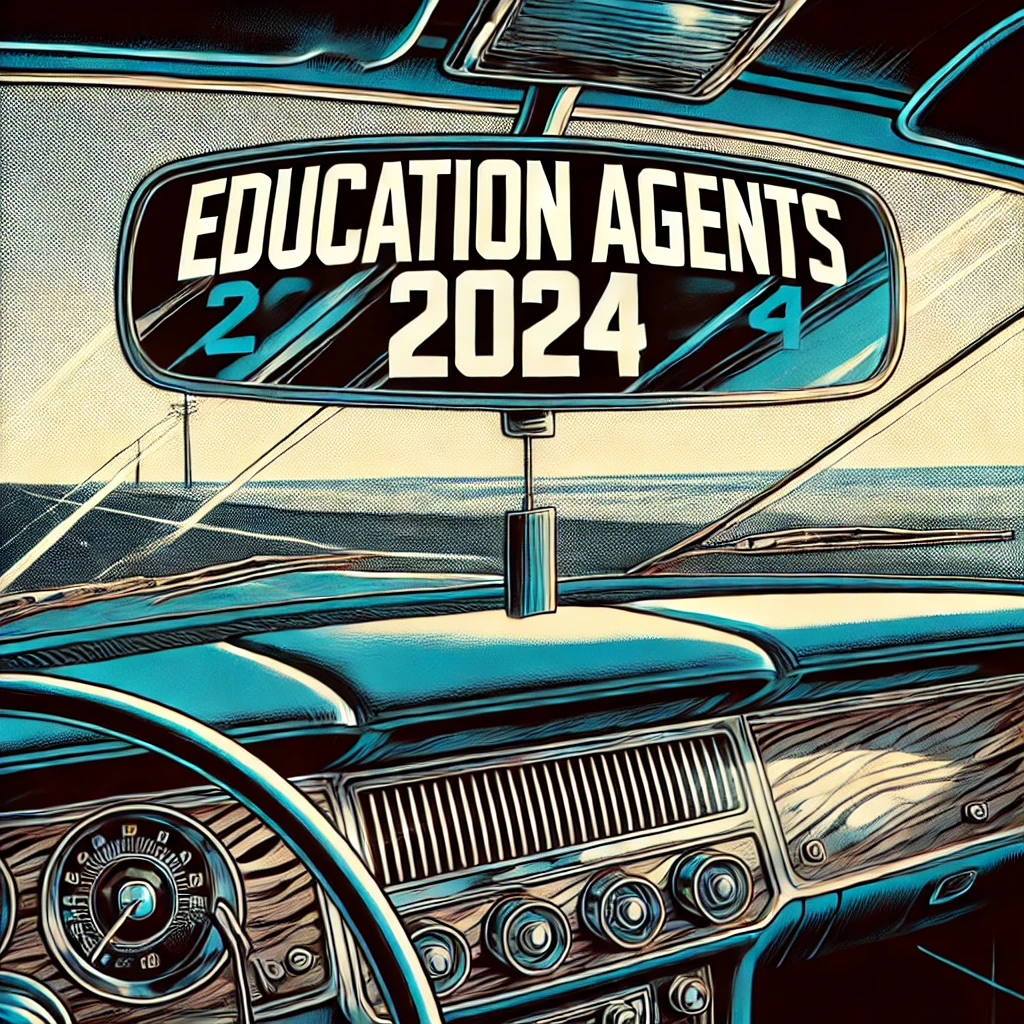
Dr Pii-Tuulia Nikula is an Associate Professor in the School of Business at Eastern Institute of Technology (EIT) in New Zealand. She has published a number of journal articles on education agent management and regulation. A book Pii-Tuulia co-edited on the topic of Student Recruitment Agents in International Education was published in 2023.
(Editor’s note: Pii-Tuulia published the content below in a series of Linkedin posts in December 2024 covering key policy and practice developments across the globe relating to education agents over the previous 12 months. She kindly agreed to us republishing it here with minor changes for clarity noting the different format.)

In May 2024 the UK Graduate route: Rapid Review report included various examples of poor practices by agents and highlighted the limited transparency across the sector. The report included agent-related recommendations, such as a mandatory registration system for agents and that universities should publish data on their spend on agents and the number of students recruited.
Based on the BUILA website, around 140 universities and other entities have now signed the UK Agent Quality Framework pledge. My understanding is that DfE, the Home Office, and other key stakeholders have been discussing how this could be further strengthened (e.g. by requiring all student sponsors to be signed up), so let’s see what will happen next year. (Ed: For more on this see the Wonkhe post published on 20 December 2024: Defacto regulation of international agents is coming)
The key limitation is, of course, that a pledge is very different from actual action, and there will be situations where adoption might remain symbolic in nature. You may want to use Vincenzo Raimo’s checklist as a starting point (Ed: see link below), or Chapter 10. ‘Agent Management Best Practices’ authored by Eddie West & I in ‘Student Recruitment Agents in International Higher Education‘ book.
(Ed:
- Comments on the Linkedin post raised the ongoing discussion in the UK about the feasibility of listing the linked agent on the CAS for visa application, and the British Council’s new ‘I am a UK Certified Counsellor’ digital badge for agents.
- Click here to read Pii-Tuulia’s original Linkedin post on the UK.)

There have been significant changes affecting the whole international education sector in Canada this year. For me the interesting new agent-specific initiative is the British Columbia Education Quality Assurance Code of Practice, which comes into force in January 2025. The five-page document includes obligations across ten key areas, of which the ‘education agents’ section is the most detailed one. It includes clauses stating that institutions:
- are responsible for their agents, including “all representations made by the education agents to prospective and enrolled students”.
- “must have practices for effectively managing and monitoring the performance and conduct of agents” (e.g. specific mentions of reference checks, written contracts, and information provision requirements)
- must not accept students from an agent if the agent is engaged in specific unwanted practices, such as unauthorised immigration advice
- must provide {upon request} information about their agents and agency relationships (e.g. copies of advertising, agreements, assessment results).
The agent definition includes sub-agents, which will make some of these requirements quite an ask for institutions that work with aggregators. Of course, the Code and the actual implementation (and/or regulator’s ability and competencies to monitor/enforce) are different things.
(Ed: Click here to read Pii-Tuulia’s original Linkedin post on Canada.)

It has been a hectic year for the Australian international education sector. The whole shambles of the Government’s plan to introduce international enrolment caps from 2025 onwards (with no/limited sector consultation), culminated in the Government, at the last minute, failing to get enough support to pass the bill. This has been comprehensively reported by The Koala News.
The ESOS Amendment Bill also proposed some agent-specific changes, such as a change in the definition of an agent and added provisions requiring institutions to disclose their financial arrangements. What should be of interest are the 200 + stakeholder submissions, many of which offer valuable insights into the views and operations of both education institutions and agents (such as IDP). Definitely worth a read!
As a result of the bill, it was reported that some universities and private providers were promising additional financial incentives (some quite massive!) in an effort to recruit as many students as possible before 2025 when gaps were expected to begin. Meanwhile, other providers wrote to their agents stating that their 2025 cap was already full. It certainly has been a disruptive year for the sector!
(Ed: Click here to read Pii-Tuulia’s original Linkedin post on Australia.)

Immigration NZ released the new education agent performance data in 2024, including volumes & visa approval rates. I conducted some analysis on this, please see links to those posts in the comments.
NZ providers are now being asked to publish self-reviews of their agent management practices as part of their wider Code obligations. These provide some insights into agent management practices, but often remain surface level/fail to adopt a critical lens. E.g. this can be seen in the agent section of the first verification summary by Universities NZ. UNZ seems to have recognised this as the recommendations for 2025 include that ‘the verification panel should prioritise discussions about agent management processes’. (Agree. Plus they should be trained to be able to ask the right questions!)
The International Student Experience Survey shows that more than 80 % of students in NZ rated the services provided by/knowledge of their agents/advisors as good, very good, or excellent. Of course, the wording of agent/advisor can be quite problematic if you are mainly interested in institution-contracted agents.
ICEF collaborated with Education NZ (who discontinued their own Recognised Agency scheme ENZRA in 2023) to launch New Zealand Education Agent Course earlier this year.
(Ed: Click here to read Pii-Tuulia’s original Linkedin post on NZ.)

I’ll also review some of the industry reports and analyses that were published in 2024.
ICEF Agent Voice Report 2024
- Survey of 1021 agents across 111 countries.
Some key findings:
- 86 % of respondents wanted more training from their partner institutions.
- Agents reported that obtaining a student visa is now the key concern affecting student decision-making (44 %), followed by cost of living (32 %) & work opportunities (17 %).
- The 2024 report contains less data compared to previous releases of the Agent Voice results (including on agent operations).
- Limited information on the methodology & respondents.
INTO Global Agent Survey 2024
Some key findings:
- Survey of 1240 agency staff from over 65 countries.
- Agents reported that students are now applying to more destinations and more institutions than before.
- Agents ranked response times to enquiries and applications as the most important factors when assessing their partner institution relationships.
- 79 % of agents who enrolled students in the UK had completed British Council Agent Training.
- Some information on the methodology and fairly detailed data provided.
Flywire Agent Outlook
- Survey of 526 higher education admissions/international student office staff from Australia, Canada, UK, US, and Mexico.
Some of the key findings:
- 92+ % of respondents were satisfied with the quality and quantity of students, and the services provided by agents.
- 82% of respondents expect to use agents more in the future.
AgentBee Annual Report: Aggregator Sub-Agent Networks
AgentBee has been doing some good work tracking the aggregator space and the growth of sub-agent networks. You can find their 2023 analyses here.
General Observations on the Reports
- Many interesting & topical insights that can help educational institutions to refine their agent management strategies.
- Methodology: often missing details, such as who were the respondents (e.g., agency leaders/student counselors; HEI contracted agents/independent counselors); sampling process; actual survey instruments (questions/response options)
- Descriptive nature of the analysis is fit-for-purpose for these reports, but it would be great to see some of the data made available for more advanced statistical analyses that could further explore differences between respondents etc.

Set out below are four academic (open-access) articles published in 2024 that explore the use of agents and/or other intermediaries. All of these studies have a wider focus, I’ve only summarised some of the agent-related findings.
‘Middling mobility and emerging cultural capital: a positional competition perspective on Chinese students studying in South Korea’ (Ruixin Wei) is based on interviews with educational consultants, parents, students, and HR managers. The findings highlight the role consultants play in supporting students and parents in finding information, crafting applications as well as the influence agents have on decision-making.
‘An Education in Exploitation: Chinese International Secondary School Students and the Dark Side of International Education’ (Helen Liu) is based on interviews with Canadian high school teachers and Chinese high school students. The study identified some problematic practices by agents, including poor information and service, and limited transparency of financial arrangements.
‘“To Whom Should I Complain”?: Exploring the Obfuscated Role of State and Non-State Agencies in Indian International Student Recruitment by GTA Colleges’ (Sutama Ghosh & Raymond Garrison) was based on interviews with Indian students in Canada, agents, family members, prospective students, college administrators etc. The authors highlight the common practice of sub-contracting, and how sub-agencies varied in size/competencies. Major issues in Indian agents’ ability to convey correct information were identified, and many students reported that they had been mislead by agents.
‘‘Study-abroad influencers’ and insider knowledge: how new forms of study-abroad expertise on social media mediate student mobility from India to Germany’ (Sazana Jayadeva) used social media & WhatsApp groups as well as interviews to explore student mobility from India to Germany. Students reported that agents in India either advised against Germany, or charged notable service fees. The study identified “A strong anti-consultant narrative” and ‘awareness-raising’ posts about the dangers of using a consultants.
Working with education education agents?
AgentBee’s education agent due diligence solution supports educational institutions to implement best practice education agent due diligence processes.
Educational institutions can use it to:
- protect students – conduct initial and ongoing due diligence checks on education agents.
- protect your brand – detect cases of unauthorised agents using your institution’s name, logo or other IP without permission.
Our clients include…
Get new posts…
Follow AgentBee on Linkedin to get our latest posts on education agents as they drop – (click the icon below)


